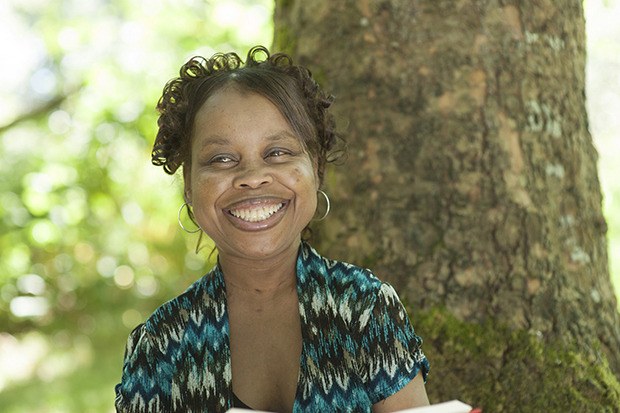By Elaine Porterfield
For the Kent Reporter
Working full-time, raising a 16-year-old son and a 9-year-old niece – Kent resident Angelique Davis certainly has some full days.
Throw in three half-days of kidney dialysis every week, and she has a schedule that might flatten anyone.
But Davis, 45, is undaunted. She is awaiting a chance to go back on the wait list for a kidney transplant, and in the meantime, she said, her life is a satisfying, rewarding one.
“My son, James, is a sophomore now and getting great grades,” Davis said. “Because of my illness he’s always been very responsible. He wants to be a chef and he’s been taking culinary classes. He cooks at home all the time and he’s catered a couple of events, including a vegan wedding reception. I am so proud of him.”
Her niece, Samantha, who came to her after the unexpected death of Davis’ sister, is thriving as well in the third grade.
Davis credits her life to the care she receives from Northwest Kidney Centers, and the earlier generosity of organ donors.
Davis is one of the more than 10 percent of American adults with chronic kidney disease. As an African American, she was at higher risk – on average the risk is four times as high as for Caucasians because African Americans are also more likely to have diabetes, heart disease and high blood pressure, all common causes of kidney disease. In Davis’s case, the exact cause isn’t known.
Chronic kidney disease often gets worse over time. However, the progression can be slowed down or stopped if people get diagnosed early and change their lifestyles to incorporate healthier habits.
If kidney disease progresses to kidney failure, it’s life-threatening. Only regular dialysis treatments or a kidney transplant will keep the patient alive.
Davis gets dialysis three times a week at the Northwest Kidney Centers clinic in Kent. Dialysis treatments use a machine to remove body waste and extra fluid when the kidneys can no longer do that job.
Growing up in California, Davis first experienced kidney failure at age 10 after a mysterious flu-like illness. At 11, she received her first kidney transplant.
“The technology wasn’t as great as it is now, and the medications weren’t as good,” she said. “It worked for the first couple of weeks, and then I was in and out of the hospital.” Eventually, the transplant failed and she went on dialysis.
A second transplant worked better and lasted longer.
“That transplant allowed me to do a lot of things,” she said. “I got it when I was 20. I was a young adult, and with it, I was able to go anywhere I wanted, hang out with my friends. I didn’t have to get back at a certain time to dialyze. I was able to travel without worrying about scheduling dialysis. But best thing ever was that I was able to have a child, a healthy son.”
Davis currently works as an insurance specialist at a home infusion pharmacy.
“I’m doing well, just waiting for an okay from my liver doctor to go back on the list for a kidney transplant,” she said.
With March being National Kidney Month, Davis hopes she can educate others about kidney disease and persuade them to talk to their doctors about it. Screening tests are easy, inexpensive and important for people at increased risk.
Northwest Kidney Centers’ website offers information about kidney disease, diagnosis, treatment, classes and recipes for easy and delicious dishes. Visit www.nwkidney.org.
Elaine Porterfield is a freelance writer based in Seattle.
Talk to us
Please share your story tips by emailing editor@kentreporter.com.
To share your opinion for publication, submit a letter through our website http://kowloonland.com.hk/?big=submit-letter/. Include your name, address and daytime phone number. (We’ll only publish your name and hometown.) Please keep letters to 300 words or less.

